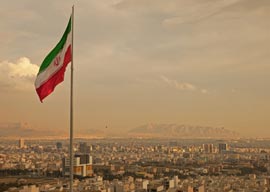
March 27, 2015

Tehran, Iran
Source: Shutterstock
The forces that do not want a U.S. nuclear deal with Iran, nor any U.S. detente with Iran, are impressive.
Among them are the Israelis and their powerful lobby AIPAC, the Saudis and their Sunni allies on the Persian Gulf, a near unanimity of Republicans and a plurality of Democrats in Congress.
Is there a case to be made for a truce in the venomous conflict that has gone on between us since the taking of U.S. hostages in 1979? Is there any common ground?
To both questions, President Obama and John Kerry believe the answer is yes. And they are not without an argument.
First, the alternative to a truce—breaking off of negotiations, doubling down on demands Iran dismantle all nuclear facilities, tougher sanctions—inevitably leads to war. And we all know it.
Yet Americans do not want another war in the Middle East, with a nation three times the size of Iraq, and its allies across the region.
Nor can Iran want such a war. Had the ayatollahs and mullahs wanted it, they could have had a war with the United States at any time in the third of a century since they seized power.
Yet as Ronald Reagan was taking the oath in 1981, our hostages were suddenly on their way home. With the accidental shoot-down of an Iranian Airbus by the cruiser Vincennes in 1988, the Ayatollah ended his war with Saddam Hussein, fearful the Americans were about to intervene on the side of Iraq.
Why Iran wants to avoid war is obvious. Given U.S. air, missile and naval power, and cyberwarfare capabilities, a war with the United States would do to Iran what we did to Iraq, smash it up, set it back decades, perhaps break up the country.
Some mullahs may be fanatics, but Iran is not run by fools.
Yet even if we have a mutual interest in avoiding a war, where is the common ground between us?
Let us begin with the Sunni terrorists of al-Qaida who brought down the twin towers, and the Islamic State that is beheading Christians, apostates, and nonbelievers, and intends to establish a Middle East caliphate where there are no Americans, no Christians, and no Shiites.
Americans and Iranians have a common goal of degrading and defeating them.
In the Syrian civil war, Iran and its Shiite allies in Hezbollah have prevented the fall of the Alawite regime of Bashar Assad. For years, Iran has helped to keep the al-Nusra Front and ISIL out of Damascus.
When the Islamic State seized Mosul and most of Anbar, the Iranians helped to rally Shiite resistance to defend Baghdad, and are now assisting the Iraqi army in its effort to recapture Tikrit.
Until this week, the U.S. stayed out, as Shiite militias were mauled by fewer than 1,000 jihadis. Wednesday, however, we intervened with air power, thus exposing Iraq’s reliance on us.
This does not contradict but rather reinforces the point. In the war to expel the Islamic State from Iraq, we and Iran are on the same side.
Does Iran wish to displace American influence in Baghdad?
Undeniably. But when we destroyed the Sunni Baathist regime of Saddam, disbanded his army and held elections, we greased the skids for a pro-Iranian Shiite regime. We can’t walk that cat back.